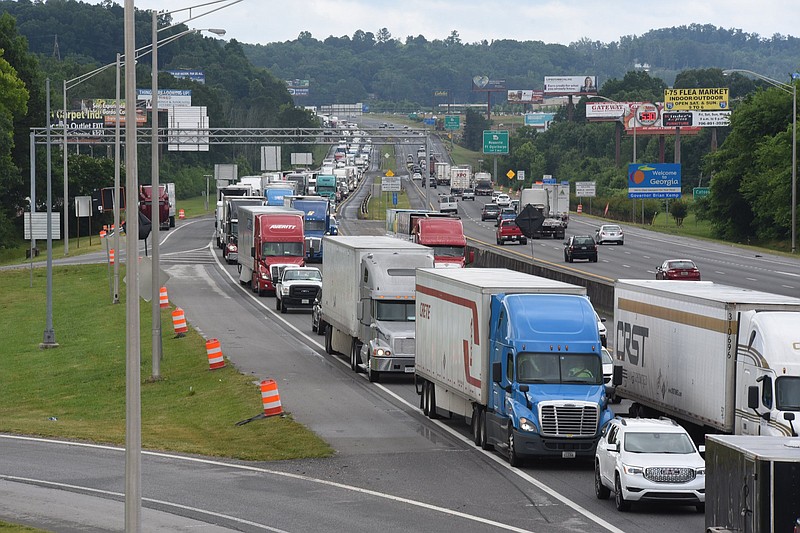Tennessee Gov. Bill Lee earlier this week unveiled his "Build With Us" transportation plan that includes what have been called "Choice Lanes."
Choice Lanes, the governor's office says, "are price-managed lanes that use pricing to proactively manage demand and provide travel-time reliability."
In other states they refer to these as "toll lanes," but the administration explains, "Unlike toll roads, drivers have an option or choice to use general purpose lanes where a user fee is not charged. [Tennessee Department of Transportation] is not proposing toll roads, just Choice Lanes."
That's just semantics, though.
The entire transportation plan is likely to be heavily debated in the upcoming legislative session, and we hope all alternatives to such lanes will be on the table. The state currently has no toll roads, or, shall we say, Choice Roads, and has long made it a point of pride not to issue government debt to bankroll road maintenance but to "pay as you go." We'd prefer to keep things that way if possible.
Usually, the discussion around roads centers on whether to raise the state gas tax or to find alternative methods of paying for road work.
Even though the state hasn't had toll roads since the 1930s, according to Times Free Press archives, it's never been off the minds of governors and legislators for the past 50 years.
During that period, the state took its biggest step toward such roads in 1975 when the Tennessee legislature created the Tennessee Tollway Authority. Then-Democratic Gov. Ray Blanton vetoed the Democratic-dominated legislature's measure, saying it would drain funds from the state transportation department, but the legislature overrode the veto.
(READ MORE: Tennessee governor promotes ‘Transportation Modernization Act’ in Chattanooga)
Bill sponsor James Lanier, D-Dyersburg, said there was no harm in having the Authority because no money would be expended until a decision was made to build a toll road. However, he had his eye on an Interstate 55 spur that would run from Dyersburg to Jackson.
That agency was to last 20 years but was extended to 2002. But no toll roads were built.
Over those 27 years, Republican Gov. Lamar Alexander considered building them at least twice, the second time for what were called the state's Bicentennial Parkways. In the end, the gas tax was raised.
"[T]here just wasn't any clear evidence that tolls wouldn't reduce traffic on these roads," the governor's spokesman, John Parish, said in 1986.
In 1989, members of the Greater Nashville Regional Council met with legislators from northern Middle Tennessee to discuss a northern loop of Interstate 840, which was planned to be an outer loop around Nashville.
At the time, the state transportation department said the state had no toll roads because they wouldn't pay for themselves.
"All the studies that we have seen have shown them not to be cost-effective," said Gwen Hopkins, a department spokeswoman.
But then-Democratic Gov. Ned McWherter hadn't closed the book on them, saying the state couldn't keep returning to raising the gas tax.
"It seems to me that if they (tolls) bring in 40 to 50 percent of the revenue," he said, "that's much more money that we haven't had and it does get a project underway."
The northern route was never built, but the southern route of I-840 eventually did become a reality, the final link opening in 2012.
After the Tennessee Tollway Authority expired in 2002, the state went several years before the topic came up again. Then Department of Transportation Commissioner Gerald Nicely suggested in 2005 the state should consider building toll roads and let them be operated privately. Then Democratic Gov. Phil Bredesen was said to be "not warm" to the idea.
Within two years, toll roads again became all the rage, and Bredesen warmed to the idea.
In 2006, he said he could support a similar authority to what the state had previously, and in 2007 he went further.
"Having that in our pocket as one of the options of how we meet our road-building needs," he said, "I think that's a sound, sensible thing to do. The nice thing about toll roads is that you don't have to use them. We're not talking about putting them on any existing roads."
State Sen. Bo Watson, R-Hixson, said at the time he supported the establishment of such an authority but not any individual project until the public had a chance to offer feedback.
"The public ought to discuss if they want this type of financing or not," he said.
The legislature passed the Tennessee Tollway Act in 2007, allowing one toll bridge and one toll road project to be created, but none were.
After Bredesen left office, talk about toll roads quieted because Gov. Bill Haslam had spoken against them during his 2010 campaign. As late as 2017, state Transportation Commissioner John Schroer said there were not enough vehicles to make toll roads viable in the state.
Now, Lee's proposal would have the Department of Transportation owning any future Choice Lanes in Tennessee, but they would be designed, built, financed, operated and maintained by a private-sector partner through a public-private partnership in exchange for user fees from the Choice Lanes.
We like public-private partnerships and we understand the need for improving and maintaining roads, but we believe the proposal needs robust discussion. Toll roads, or Choice Lanes, should be a last option.
